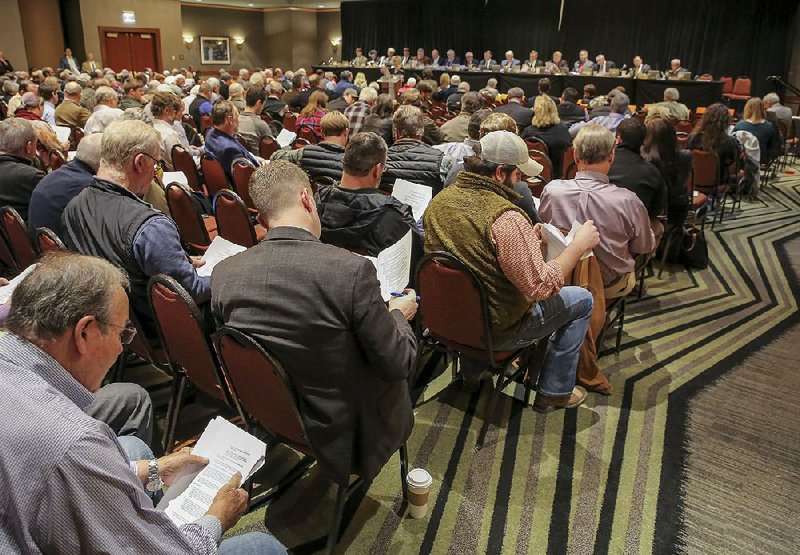Proposed legislation to levy fines of up to $25,000 on scofflaws who illegally spray dicamba lacks an emergency clause, the same omission that hampered the effects of a similar effort two years ago.
The 2017 law, Act 778, allows the Plant Board to levy fines of up to $25,000 for "egregious" violations of pesticide law only "when significant off-target crop damage occurred."
The board hasn't levied such a fine in the nearly two years the law has been in effect because the source of secondary off-target movement of dicamba is difficult, if not impossible, to trace, according to weed scientists. The previous maximum fine was $1,000.
House Bill 1512 by Rep. David Hillman, R-Almyra, is up for a vote in the state House of Representatives on Monday.
The bill strips the 2017 law of the "significant off-target crop damage" language and defines an "egregious violation" as any application of dicamba and similar herbicides that violates federal law or Plant Board regulations.
[RELATED: Complete Democrat-Gazette coverage of the Arkansas Legislature]
The 2017 law took effect on Aug. 1 that year, deep into the growing season. By then, the Plant Board had implemented a July 11 emergency ban on spraying dicamba because of the number of complaints of damage the board had received.
If the bill is approved by the House, Hillman said Friday he'll try to have an emergency clause placed on the bill when it goes to the Senate.
The Plant Board and various agriculture groups wanted a change in the law, as provided for in Hillman's bill, to allow the maximum fines of $25,000 be applied to spraying past the cutoff date regardless of whether damage was reported.
"It needs to have an emergency clause," Andrew Grobmeyer, executive vice president of the Agriculture Council of Arkansas, said Friday. "I'm not sure why there is not."
Grobmeyer said the 2017 law had the same problem.
"We will express the need to include one before this becomes law so it's in effect this growing season and through the application window set by the Plant Board," Grobmeyer said.
A bill with an emergency clause approved by both chambers takes effect immediately upon a governor's signature. Bills approved without the clause take effect 90 days after formal adjournment.
The Plant Board on Wednesday, after a public hearing and debate of more than nine hours, voted to allow in-crop use of dicamba through May 25, with other restrictions. Farmers had an April 15 cutoff date last year, which, in early spring, effectively rendered dicamba useless against pigweed now resistant to other herbicides. Some farmers still sprayed illegally, various Plant Board members said.
"The board voted on this proposal with the intent that the legislation would be in effect this coming growing season," said Greg Hay of Conway, the board's chairman. He said the emergency clause is needed.
Spraying a formulation of dicamba not legal for in-crop use would be considered an "egregious" violation, as would violating a cutoff date, Plant Board officials have said.
HB1512, with an emergency clause and if enacted into law, would take effect well before May 25. Without an emergency clause, depending on when the Legislature formally adjourns, the law likely wouldn't take effect until July or August. The time difference leaves open a window for illegal applications of dicamba after May 25 without legal or financial consequences.
Hillman said the possibility of the Plant Board retaining the April 15 cutoff led him to not put an emergency clause on his bill. It flew through a House committee Wednesday morning, just as the Plant Board was meeting across town in a public hearing that attracted about 250 people.
Marty Eaton, a Plant Board member from Jonesboro, cited Hillman's bill in leading the effort late Wednesday afternoon to relax restrictions on dicamba's use this summer.
Eaton at one point sought to allow farmers to spray dicamba through May 31. "If you violate May 31, just get your checkbook out," he said.
"The April 15 date would have made this bill harder to pass," Hillman said. "That was my decision to not include it [emergency clause]. I didn't talk to the Plant Board. My strategy was, how do we get this bill passed? I knew there'd be opposition. An emergency clause draws red flags from everywhere."
Bills with emergency clauses require a two-thirds majority vote in each chamber to pass -- 67 votes in the 100-member House, and 24 in the 35-member Senate.
The May 25 cutoff date set by the Plant Board satisfied some farmers opposed to his bill, or at least smoothed over some of their concerns, Hillman said.
"My bill's already set in motion," Hillman said of preferring to seek an amendment in the Senate rather than slowing his bill's progress in the House.
He said his bill received a do-pass recommendation of a House committee within 10 minutes of discussion. "I talked eight or nine minutes of that," he said. "I just don't want to pull it down right now for amendment."
If the Senate adds an emergency clause to Hillman's bill and approves it, the amended bill also will have to be approved in the House.
Sens. David Wallace, R-Leachville, and Blake Johnson, R-Corning, are co-sponsors of Hillman's bill.
Wallace said he and Johnson talked Friday morning and agreed the bill needs an emergency clause.
"That's something we need to do," Wallace said. "We'll amend it, and I expect no problems. All it does is clarify the Plant Board's ability to do their job."
The Plant Board's May 25 cutoff goes before the legislature's rules and regulations review subcommittee at 11 a.m. Monday. HB1512 will go before the full House sometime after it convenes at 1:30 p.m.
Business on 02/23/2019
